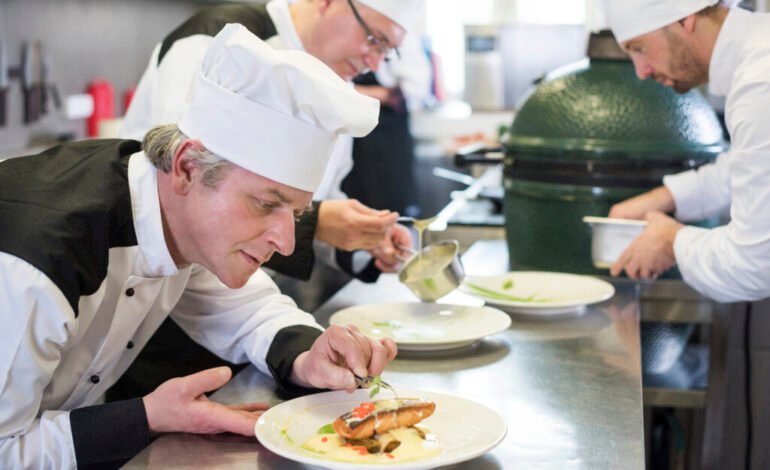How Advanced Catering Training Elevates Service on the High Seas

Catering plays an essential role in life at sea, whether it’s delivering five-star dining experiences for guests on luxury yachts and cruise ships or providing nourishing meals to support the health and morale of seafarers onboard merchant vessels.
The unique challenges of preparing and serving food in a maritime environment—such as limited storage, diverse dietary needs and long periods at sea—demand more than just basic skills. They require expertise, adaptability and a deep understanding of the dynamics of catering onboard.
Advanced catering training equips crew members with the skills needed to meet these demands, elevating standards of food service and hospitality across all types of vessels. Supported by maritime catering management, this training ensures every aspect of onboard dining, from procurement to meal preparation, is handled with precision and care. Together, they create a better experience for passengers and crew alike.
In this article, we’ll explore the role of maritime catering management and the benefits of advanced training in transforming service on vessels.
What is Maritime Catering Management?
Maritime catering management is the planning, coordination and delivery of food and hospitality services aboard vessels of all types. This specialised field covers everything needed to ensure smooth operations, from sourcing ingredients and designing menus to managing food storage and adhering to strict maritime safety and hygiene standards.
It also includes the training and development of catering personnel, ensuring they are equipped to handle the unique challenges of preparing and serving meals at sea. These challenges range from working in compact galley kitchens to accommodating diverse dietary requirements for both passengers and crew members.
Shipowners increasingly rely on specialist maritime catering management companies to oversee these responsibilities. These companies bring expertise that helps ensure catering operations are efficient, reliable and cost-effective while maintaining compliance with industry regulations. By partnering with these professionals, shipowners can focus on core operations while providing high-quality service that meets the needs of everyone onboard.
Benefits of Hospitality and Culinary Training Onboard Vessels
Elevating Guest Experiences
For luxury yachts and cruise ships, the quality of onboard hospitality and dining defines the guest experience. Advanced catering training gives crew members the expertise to deliver five-star service, from mastering fine dining etiquette to preparing bespoke menus tailored to individual preferences.
Well-trained staff anticipate guest needs, adapt to requests and create seamless dining experiences that leave a lasting impression. This level of service elevates a vessel’s reputation, encourages repeat bookings and sets it apart in an increasingly competitive industry.
Supporting Crew Wellbeing and Morale
On merchant vessels and working ships, meal times provide a vital sense of normality and comfort for seafarers during long and often demanding voyages. Culinary training for ship cooks and stewards ensures that crew members receive nutritious, balanced meals that reflect the diverse dietary needs and cultural preferences of a multinational crew.
High-quality meals contribute to better physical health and boost morale, fostering a positive working environment that enhances productivity. A well-fed crew is a motivated crew, and advanced training ensures that catering staff are prepared to meet the challenges of feeding a diverse team while maintaining high standards.
Improving Operational Efficiency
Operating a kitchen at sea comes with unique logistical challenges, including limited storage space, extended voyage durations and the need to make provisions last without compromising on quality. Culinary and hospitality training prepares catering staff to manage these constraints efficiently, teaching them to plan menus, portion meals and store food efficiently.
Advanced training also helps streamline food preparation and service, reducing waste, optimising workflow and ensuring uninterrupted service throughout the voyage. By improving efficiency, trained personnel contribute to significant cost savings for shipowners, all while maintaining high service standards.
Enhancing Safety and Compliance
Safety and hygiene are critical in any catering operation, but especially onboard vessels where any lapse in standards can lead to serious consequences, such as foodborne illness or contamination. Culinary training places a strong emphasis on international maritime health and safety regulations, ensuring catering staff understand proper food handling, storage and preparation techniques.
Trained personnel also learn to operate safely in compact galley environments, minimising risks while maintaining strict compliance with industry standards. This reduces risks to both passengers and crew and protects the vessel’s reputation for reliability and professionalism.
Encouraging Career Development and Retention
Investing in hospitality and culinary training shows a clear commitment to crew development, creating opportunities for staff to grow professionally. Training equips catering teams with transferable skills that can open pathways to higher positions within the maritime industry or even to land-based roles.
For shipowners, this investment translates into a more motivated workforce, lower turnover rates and long-term operational stability. By fostering a culture of growth and opportunity, vessels create a positive working environment that inspires loyalty and commitment from their crew.
Final Thoughts
The maritime industry thrives on its people, and advanced hospitality and culinary training ensures they have the skills and confidence to deliver at the highest level. Whether it’s creating unforgettable dining experiences for guests on luxury yachts and cruise liners or supporting the health and morale of seafarers on merchant vessels, catering excellence touches every aspect of life at sea.
By investing in training, shipowners show their commitment to quality, safety and sustainability, building stronger teams and more efficient operations. These efforts not only set higher standards for onboard service but also contribute to shaping a future where maritime hospitality meets the highest standards.











